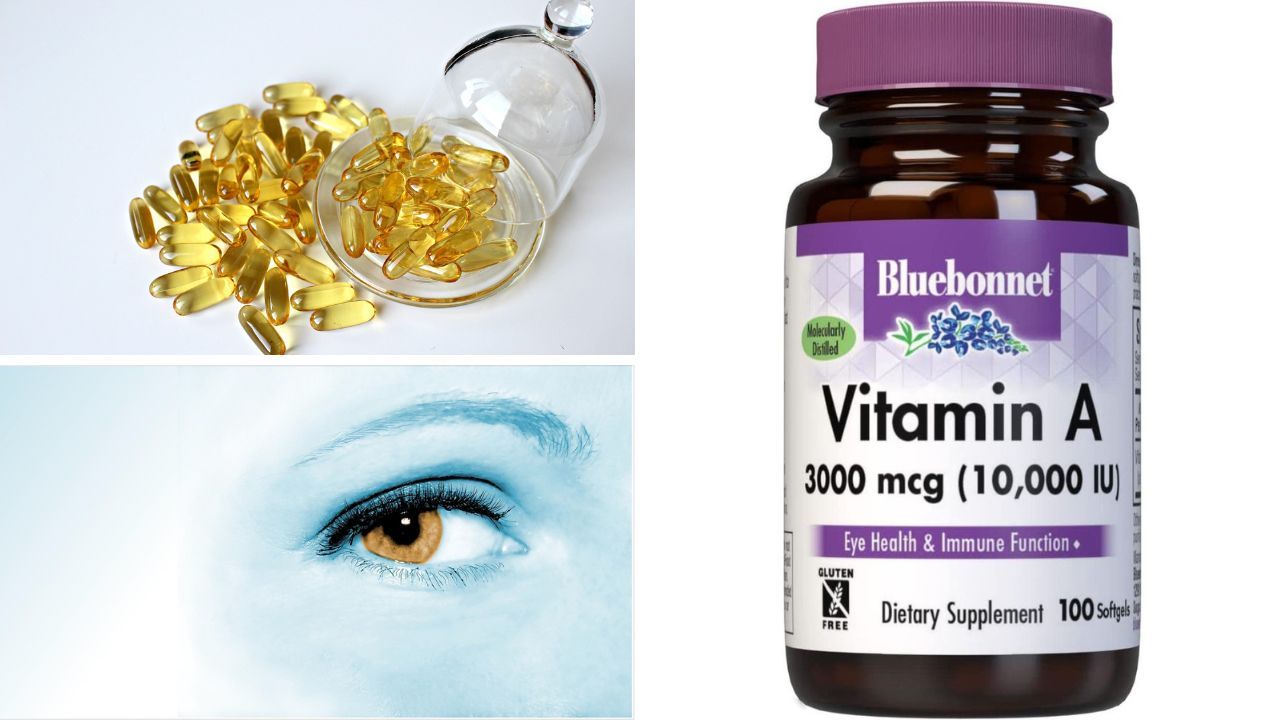Vitamin A is an essential vitamin that plays a major role in the health of your skin, eyes, and immune system. It's also necessary for the growth and development of bones and muscle weakness.
Your body can't make vitamin A on its own, so you need to get it from food sources or dietary supplements. Vitamin A supplements are available in several forms: retinol (pre-formed vitamin A), retinyl palmitate (a form of folic acid pre-formed vitamin A), beta-carotene (the plant form of vitamin A), and mixed carotenoids (a combination of all three).
If you're considering taking a vitamin A supplement, there are many factors to consider. You may want to start with one type initially, then switch to another if you don't notice any benefits after a few weeks.
There are various forms of this essential vitamin, so it can be hard to determine which one fits your needs best. In this article, we'll explore all the different types of Vitamin A and why they're important for optimal health & provide information about the best sources of Vitamin A so you can make sure your body is getting what it needs.
Here are our Top Picks, which we hope you will enjoy reading about. Each product on this list has been hand-picked by an editor. All opinions on this post are our own. Moreover, we wanted to inform you that - Dapper Digests may receive a share from sales from links on this blog if you decide to purchase anything (It's how we remain in business). We edit all of our reviews to make them easy to read and concise so that you Never Miss Another Great Find Again!
How We Selected The Best Vitamin A Supplements
Looking for the perfect vitamin A supplement can be a daunting task, but fear not! Your search ends here with our carefully curated selection of the best products in the market.
We know how overwhelming it can be to choose from so many options, but our team of experts has done the hard work for you.
We've tirelessly researched the market and evaluated each product to identify the top vitamin A supplements that deliver the benefits you seek. With our guidance, you can easily find the right supplement that meets your needs and exceeds your expectations.
So take a deep breath and get ready to discover our top recommendations that are sure to match your requirements!

Natural Factors, BetaCareAll
Best Vitamin A For Healthy Skin, Vision & Immune Function
Why We Suggest It
If you're looking for a vitamin A supplement that's more packed than a middle-schooler's backpack, then the Natural Factors BetaCareAll 25,000 IU Vitamin A Supplement is your jam.
With 25,000 IU of natural beta carotene (which converts to 8330 IU of vitamin A), this supplement is a powerful antioxidant that can help protect your body against free radical damage.
And if that's not enough, this supplement also contains other beneficial carotenoids from the sea plant Dunaliella salina, which can give your immune system an extra boost.
It's like a superhero for your cells, but without the spandex.
Learn More About It
Looking for a vitamin A supplement that's the real deal? Look no further! Providing all the benefits you need without artificial colors or preservatives, Natural Factors BetaCareAll 25,000 IU Vitamin A Supplement is like a superhero in a bottle.
Plus, it's non-GMO certified, so you can rest assured that you're getting a clean, pure product. And if you really want to boost absorption, just pop that bottle in the fridge for 30 minutes before taking a softgel out of it.
It's like a cool little gift for your body - it doesn't get much better than that!
Why We Suggest It
Looking to get your Omega-3s without having to chow down on a whole fish? Bluebonnet Nutrition's Fish Oil Softgels have got you covered! These capsules are packed with 10,000 IU of Vitamin A from Fish Oil, so you can enjoy all the benefits of Omega-3s without the hassle.
Plus, they're free of gluten, barley, rice, sodium, and sugar, making them a great choice for people with dietary restrictions. With phospholipids that help keep your eyes healthy and astaxanthin to support vision, you can feel good about supporting your health with these softgels.
Learn More About It
Don't like the idea of swallowing a whole fish? Neither do we. That's why we recommend Bluebonnet Nutrition's Fish Oil Softgels - the perfect solution for getting your daily dose of Omega-3s without the fishy aftertaste.
Packed with 10,000 IU of Vitamin A from Fish Oil, these softgels are also gluten-free, barley-free, rice-free, sodium-free, and sugar-free. Plus, they contain phospholipids and astaxanthin to keep your eyes healthy and support healthy immune function.
Just pop two in your mouth and wash them down breakfast cereals with water or orange juice - easy peasy! And for best results, store them in the fridge to maintain freshness and optimize absorption.

NOW Vitamin A
Best Vitamin A From (Fish Liver Oil) For Eye Health & Immune Function
Why We Suggest It
Looking to give your health a boost without breaking the bank? Look no further than Now Foods Vitamin A Softgels!
With a whopping 25,000 IU of vitamin A per serving, these softgels are the perfect way to supplement your diet with this essential nutrient.
And with their affordable price point, you can rest assured that your wallet will be just as healthy as you are!
Learn More About It
Looking for a vitamin A supplement at an affordable price? Now Foods Vitamin A Softgels is a great choice! These little guys pack a punch with 25,000 IU of vitamin A per serving, and they're non-GMO certified and free of artificial ingredients and corn derivatives.
The only catch? They can leave a slightly bitter taste in your sun exposure mouth. But don't worry, the taste isn't too intense and can easily be covered up by adding the softgel to your favorite drink or food.
All in all, we give these softgels a thumbs up for anyone who wants to save some cash while still getting their daily dose of vitamin A.
Why We Suggest It
Check out Nature's Way Vitamin A supplements! This brand is the real deal if you want high-quality vitamin d supplements that won't break the bank. Nature's Way is all about using the best ingredients, and our team can confirm that their vitamin A supplement is top-notch.
We're also thrilled to report that this product comes in an eco-friendly bottle made from 97% recycled materials! So not only are you taking care of yourself, but you're also taking care of the planet. It's a win-win situation!
Learn More About It
Nature's Way is the name you want to remember when shopping for top-notch vitamin A supplements without breaking the bank. They are a real gem in the sea of sketchy supplement brands out there!
They source only the purest ingredients and are eco-conscious, too. Their supplement bottle is made from 97% post-consumer recycled materials. How cool is that?
The Nature's Way vitamin A supplement is also free of nasty stuff like yeast, wheat, corn, dairy, artificial colors, and flavors. And if you're watching your sodium intake, you'll be happy to know it's salt-free, baby! So, go ahead and enjoy healthy eyesight and a happy heart with Nature's Way vitamin A supplements.
Why We Suggest It
Looking for an affordable and easy way to keep vitamin d levels and your health in check? Look no further than Natural Factors' vitamin d content and A supplements!
These non-GMO softgels pack a powerful punch of nutrients without adding any bulk to your diet.
Plus, with just one easy-to-swallow softgel per day, it's a no-brainer addition to your daily routine.
Say goodbye to the potential harm of pesticides and hello to a healthy, happy you!
Learn More About It
With natural carotenoids that support your eyesight, skin, mucous membranes, and bones, Natural Factors vitamin A supplements are like a superhero in a capsule.ones.
Just like how Superman has his cape, this supplement comes in the form of a softgel that's easy to swallow.
But if you prefer your supplements to be more like liquid gold, this may not be the right fit for you.
FAQs About Vitamin A Supplements
If you're in the market for vitamin A supplements, the options can be overwhelming.
With countless brands and formulations available, it can be tough to navigate the sea of choices and find the right fit for your health needs.
To help simplify the decision-making process, we've compiled a comprehensive guide with all the essential information you need to make an informed choice about the best vitamin A supplement for you.
Is It OK To Take Vitamin A Everyday?
While it's important to make sure you're getting enough vitamin A in your diet, taking high doses of vitamin A supplements can be dangerous.
You should only take a supplement that contains preformed vitamin A if you have a medical condition that prevents you from absorbing this nutrient effectively.
Vitamin A is found naturally in foods like vegetables and meats, so it's best to get your vitamins from food whenever possible.
If you do need an extra boost of vitamin A, talk to your doctor about the proper dosage for you.
What Are Vitamin A Supplements Good For?
Vitamin A is a nutrient that can be found in many foods such as dairy products, eggs, and orange vegetables. However, some people don't get enough vitamin A from their diet alone and need to take supplements. There are several reasons why you may need to take extra vitamin A:
Some medications interfere with the absorption of vitamin A. This could mean that you aren't getting enough through your diet despite eating healthily. Taking a supplement will ensure you get the right amount of the nutrient every day.
What Is The Best Form Of Vitamin A To Take?
It's important to note that, while many forms of vitamin A are equally effective, they differ in their bioavailability. In other words, some forms of the nutrient get absorbed by the body more effectively than others.
The best types of vitamin A include retinol and preformed retinyl esters (also called pre-RDA). These are found in animal products such as fish oil and egg yolks. They're also found in many multivitamins, though some manufacturers may opt for a plant-based alternative instead (such as beta carotene or palmitate).
While these types of vitamin A tend to be well absorbed by the body, they can cause side effects like nausea and stomach and bone pain if taken in high doses over long periods of time.
Other forms of the nutrient include retinyl acetate and retinyl palmitate. These types are less well absorbed by the body but don't tend to cause those same side effects.
Do I Need Vitamin A Supplements?
Vitamin A is an essential nutrient that supports vision, bone health and immunity. Animal sources like meat and dairy products contain pre-formed vitamin A, which your body can immediately use. Plant foods are rich in provitamin A carotenoids, which your body converts into the active form of vitamin A as needed.
The best way to get enough vitamin A from food is to eat a variety of colors every day – orange carrots, green spinach, red peppers and yellow sweet potatoes are all good sources. If you don't eat at least three servings of vegetables daily or if you have trouble absorbing fats due to illness or medication, then a supplement may be helpful.
Your doctor can help you decide whether a supplement would benefit you based on your diet and overall health status. Your exact needs will depend on your age, gender and current health conditions; pregnant women need more vitamin d than other adults do. Be sure to follow any vitamin d doosing instructions exactly as prescribed by your doctor or pharmacist so that you don't overdo it or experience dangerous side effects such as liver damage.
Foods containing pre-formed vitamin A include:
- Beef liver (3 ounces/85 grams): 16,667 IU
- Cheddar cheese (1 ounce/28 grams): 567 IU
- Egg yolks (2 large): 3,853 IU
Plants provide provitamin A carotenoids that convert into active vitamin A in the body:
- Sweet potato (medium baked) : 2,344 IU
- Spaghetti squash (1 cup cooked) : 1,332 IU
- Winter squashes with peel intact (1 cup mashed) : 833 IU
What Are The Symptoms Of Low Vitamin A?
The effects of a vitamin A deficiency are not to be taken lightly. Some of the most common symptoms include uncomfortable itching, especially darker your skin around the eyes and ears, as well as dry, scaly patches on the skin that may appear on the arms, elbows, and knees.
In extreme cases, a lack of adequate vitamin A can lead to uncontrolled bleeding from various parts of the body, such as nosebleeds and toothaches. However, it is important to note that this is a rare occurrence, typically only seen when other health issues are present, such medical conditions such as anemia or an under-active thyroid gland.
Which Form Of Vitamin A Is Best For Eyes?
Vitamin A is an essential nutrient that your body needs daily to keep up with the high demand. It's a fat-soluble vitamin that is stored in your liver and eyes. There are two forms of vitamin A - retinol and beta-carotene, and both have unique benefits for eye health.
Retinol is found in animal products, such as dairy, eggs, and liver. It's broken down by enzymes in the small intestine and can be directly absorbed into the bloodstream.
However, people with digestive conditions like celiac or Crohn's disease may have difficulty absorbing retinol, and poor lipid absorption caused by conditions like leaky gut syndrome or bile duct disorders can also affect the absorption of this form of vitamin A.
On the other hand, beta-carotene is found in plant-based foods like carrots, sweet potatoes, and leafy greens. It needs to be converted to retinol in the body before it can be used, and it's not associated with the same risks of toxicity as retinol.
Nevertheless, it's less readily absorbed than retinol, and its bioavailability can be affected by factors such as the amount of dietary fat consumed with it. While a proper balance of retinol and beta-carotene is optimal for overall eye health, experts agree that food sources containing both forms are ideal.
Eating dark green vegetables like spinach and animal protein sources like beef liver can help ensure that you're getting both forms of vitamin A in your diet. Nonetheless, more studies are still needed to fully understand the best ways to optimize vitamin A intake for vision and overall health.
What Is The Healthiest Vitamin To Take Everyday?
It's difficult to say which vitamin is the best for you because it depends on your individual needs and lifestyle.
For example, if you're a smoker or live in a high-pollution area, you may need more vitamin C than someone who doesn't smoke or lives in an area with lower pollution.
Some people take a daily multi-vitamin that contains all their vitamins and minerals while others choose to supplement their multi-vitamin with specific vitamins they think they may be lacking.
If you feel like your diet isn't providing you with enough of certain vitamins, talk to your doctor about what type of supplement would be right for you.
Which Fruit Has Most Vitamin A?
All of these fruits are good sources of vitamin A, which is an essential nutrient for healthy eyesight. However, some fruits contain more vitamin A than others – especially when compared to the volume that you eat.
According to USDA data, a medium carrot contains about 877% of your recommended daily intake of vitamin A. This means that if you have a bowl of mixed fruit and only one carrot then this will provide almost all (876%) the amount of vitamin A that you need in a day.
In comparison, a cup of apricots has just 51% of your RDA for this nutrient, while an equivalent volume in papaya provides 69%.
Does Oral Vitamin A Help Skin?
For many years there was a belief that taking vitamin A in an oral form could help with skin conditions, but the research doesn't support this. Some studies have shown that it can prevent some of the symptoms of vitamin A deficiency such as dry, scaly skin, but it hasn't been found to be effective against other conditions such as acne or eczema.
There's also no evidence to suggest it will improve the appearance of wrinkles either. A lot of people confuse topical vitamin A products with oral supplements, and while they're both helpful for hair growth and skin health on a basic level, only the topical products are proven to give you clearer and firmer looking skin.
It's important not to confuse these two forms of vitamin A when shopping for skincare products – unless you have your doctor's advice you won't know which one is best for your needs.
What Foods Are Highest In Vitamin A?
The best sources of vitamin A include carrots, pumpkin, green beans, sweet potatoes and spinach. These vegetables are all great sources of beta-carotene which is a type of antioxidant that converts into vitamin A in our bodies.
Other good sources of this essential nutrient include dairy products such breast milk; fortified foods such as cheese and milk; eggs; cod liver oil; and fatty fish such as salmon, trout and catfish.
Vitamin A is also found in certain fruits including mangoes and oranges but these should be eaten with caution as they can increase blood levels and the likelihood of side effects if you consume too much.
Other foods high in vitamin A include beef liver, raw spinach, collard greens, Swiss chard and turnip greens.
Dosage Of Vitamin A Supplements
The recommended dosage of a a vitamin d deficiency and A supplement depends on the severity of your vitamin d deficiency itself, as well as your age and gender. If you have a healthy diet that includes plenty of nutritious foods that are high in vitamin A, then it's unlikely you'll need to take supplements unless you're suffering from an illness or condition that interferes with your ability to absorb nutrients from your food.
If you do decide to take supplements, speak with your doctor about how much is appropriate for you. It's also important to note that many over-the-counter multivitamins contain high levels of preformed vitamin A (also called retinol), which is not suitable for pregnant women or children under the age of two.
If you fall into one of these categories, make sure to ask for an all-natural supplement made with beta carotene instead. As a general guideline, most adults should be able to safely consume up to 3,000 mcg (micrograms) worth of supplemental vitamin A each day through their regular diet and other sources (such as liver).
If this amount doesn't prove sufficient, consult with your doctor about increasing the dosage until the desired effect has been achieved.
Benefits Of Vitamin A Supplements
As mentioned, Vitamin A is essential for vision. It also plays a role in the healthy development of other bodily functions, including:
Cancer prevention: As an antioxidant, Vitamin A helps to protect cells from damage caused by free radicals. This can reduce your risk of developing cancer and other diseases such as Alzheimer's.
Immunity: An adequate intake of Vitamin A is necessary for the production of white blood cells that fight infection and disease.
Bone health: As an important nutrient for cell growth, Vitamin A promotes bone health and can help to prevent conditions like osteoporosis.
Side Effects Of Vitamin A Supplements
Vitamin A is a relatively safe supplement when taken in appropriate amounts. However, large doses of the vitamin can sometimes cause side effects such as headaches, fatigue and dizziness.
The Linus Pauling Institute notes that high amounts of preformed vitamin A (not beta-carotene) may increase the risk of osteoporosis and heart disease when taken by people older adults who already have these conditions. The institute also warns against giving high doses of preformed vitamin A to children younger than 12 months because it may lead to birth defects or liver damage.
Vitamin supplements are not regulated by the U.S. Food and Drug Administration (FDA), so there's no guarantee they contain what they claim on the label. In fact, an FDA study found that one-quarter of over-the-counter multivitamins contained either too much vitamin d or less enough vitamin d and little or no Vitamin A at all!
If you want blood test to make sure you're getting enough Vitamin A from your supplements, talk with your doctor about having your blood pressure tested for this nutrient.
How Do You Choose The Best Vitamin A Supplement?
Well folks, there you have it - the lowdown on vitamin A supplements. We know it can be overwhelming with all the options out there, but fear not! Armed with our guide, you'll be able to navigate the vitamin A supplement aisle like a pro.
Whether you're team retinol or beta-carotene, or perhaps you fancy something different, there's a supplement out there for everyone.
Just remember, before you start popping those capsules, be sure to consult with your doctor first to ensure that they're right for you. Here's to your health and wellbeing!
Picking the right product is easy with these tips!
We appreciate you reading this!
Hopefully, this article has helped you make a more informed decision and that you are ready to grab your Vitamin A supplement!
If you enjoyed this article, please consider our other publications and by signing up to our newsletter, you'll have immediate access to our latest articles.













